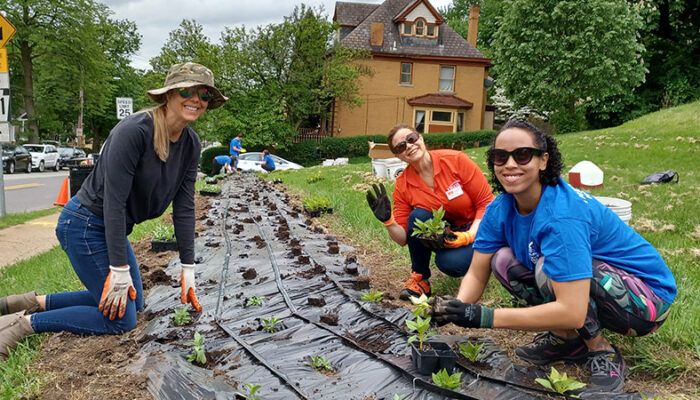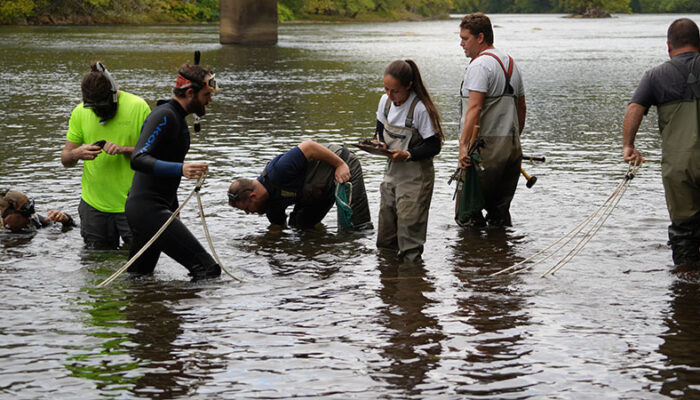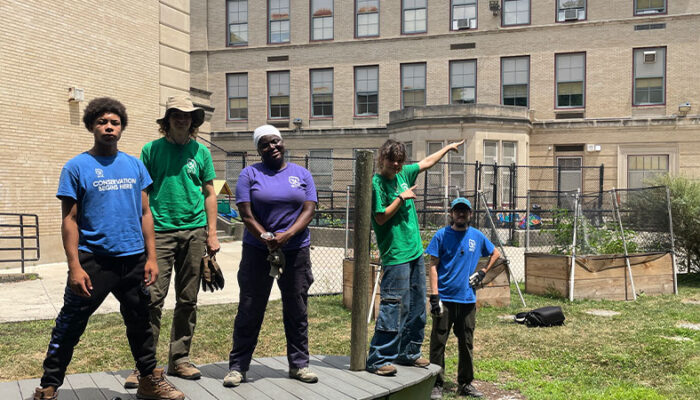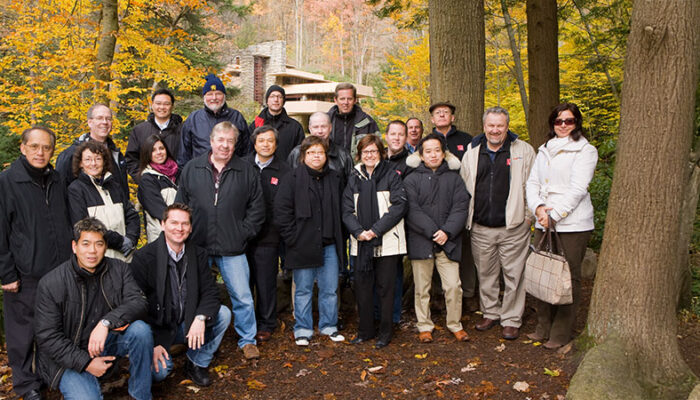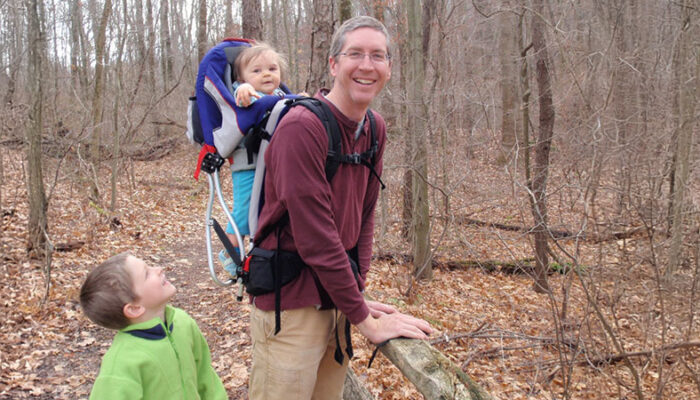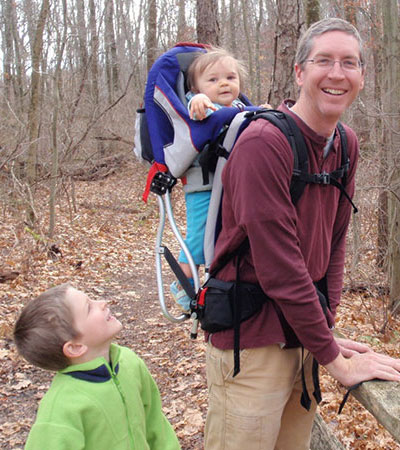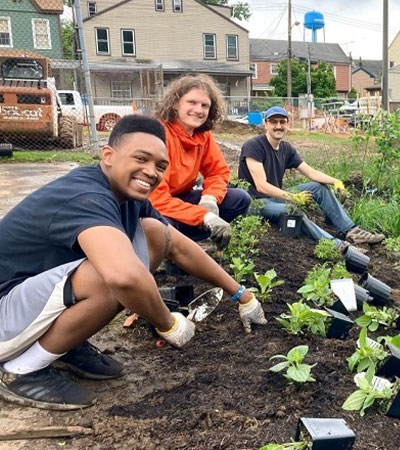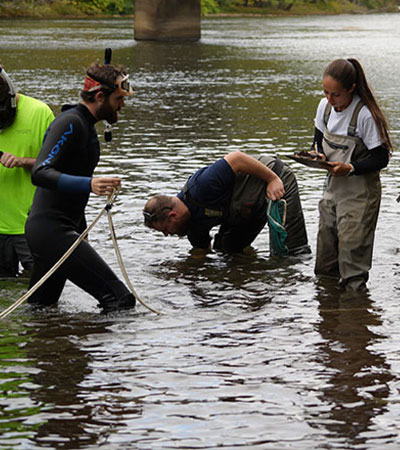Luke Bobnar
Some people find inspiration in poetry, others in majestic scenery. Luke Bobnar is inspired by wild fish—specifically, Pennsylvania’s native brook trout.
Luke, WPC’s watershed projects manager, observes changes that occur in streams and rivers across seasons. “From droughts to the power and scour of ice, water and debris, it is truly amazing that fish can survive,” he says.
“The little eggs that the trout lays in October and the fry that hatch in late winter contend with ice, flooding and debris…yet they seem so delicate,” he continues. “Thousands of years of evolution has made them so, and their species will long outlast my brief trot on the terra.”
Issues arise from people and water inhabiting the same space, Luke notes. “I look at rivers and valleys, and how people and water interact in those spaces.” Along with a diverse team of coworkers, partners and members of the public, Luke aims to solve how people and aquatic ecosystems, including brook trout, can not just exist together, but thrive.
The team uses an array of techniques, each tailored to a specific site and set of conditions. One example is a “fishable” habitat structure and an ADA fishing access pier at Sandy Beach Township Park near Luke’s Ridgway office. “It’s an extremely popular site for families and less able anglers,” says Luke. “I’m proud to have played a small role in designing and helping construct that project with several partners.” Such sites, he believes, help connect kids of all ages to nature.
Luke assesses new project sites, fundraises for and plans for new projects, works on project construction and reports on completed projects. During winter and spring, his team manually adds trees, branches and brush to approved streams as part of WPC’s Strategic Wood Additions, aka Large Wood Materials, work. (Read about one project.) In spring and summer, they use heavy equipment to install “fishable” habitat and make sure fish can pass roads or old defunct dams. Sometimes, they even squeeze in time to enjoy the ecosystems they work on!
To help people consider their relationship with nature, and their role in protecting it, Luke recommends four things:
- “Respect water, and realize that we all live upstream, as well as downstream. Consider that when you plan how you manage your property, and how you move through time and space. “
- “Connect to nature. Seek it out and engage with it, early and often.”
- “Donate to the Conservancy or specifically to the watershed work completed by WPC’s Allegheny Regional Office! (Shameless plug!)”
- Consider his personal philosophy: “Be the river. And let the river be.”
Barbara Johnstone
Yinz need to go dahn Fallingwater ‘n get to know Barbara Johnstone n’at! A retired professor of Linguistics and Rhetoric at Carnegie Mellon University, Barbara says, “I am the world’s premier (and only, really!) scholarly expert on “Pittsburghese.”
Barbara, who began volunteering at Fallingwater in 2023, loves answering visitors’ questions and sometimes helping to transcribe and translate Edgar jr.’s correspondences with artists.
Where do you live? Summers in Hidden Valley, Winters in Oakmont.
How did you become involved with Fallingwater and what motivates you to stay involved?
I started volunteering at Fallingwater because my summer home in Hidden Valley is nearby, I enjoying getting to know people by working alongside them, and I love Fallingwater and the surrounding area.
I keep doing it because Fallingwater has an excellent volunteer program. There are lots of ways we can help, and we feel like real team members. Staff members greet us by name and thank us for our work, and we are invited to participate in their workshops, book discussions, even parties.
Tell us about your favorite volunteer experience at Fallingwater.
I especially enjoy being an Ask-Me Guide. AMGs are posted (or post ourselves) at various places around the grounds to answer questions, help visitors navigate the site and take people’s pictures.
I also enjoy working in the Collections department, where I am currently transcribing (and sometimes translating) some of Edgar Kaufmann jr.’s correspondence with people such as the painter Victor Hammer.
What has been most challenging or rewarding about volunteering?
Most challenging: being on my feet for hours.
Most rewarding: seeing that visitors really appreciate the tips and information I can give them.
What advice do you have for someone who is considering volunteering?
Fallingwater is a wonderful place to volunteer. It is a privilege to be able to come to this beautiful place and help people have a good experience here.
What do you do when you’re not volunteering with Fallingwater?
Volunteering at the Greater Pittsburgh Food Bank and at Second Harvest in Sharpsburg, walking and hiking, traveling, working out at the YMCA, knitting, reading, drawing, serving as Financial Officer for the Fox Chapel Area branch of the American Association of University Women.
What is your career?
I am retired from Carnegie Mellon, where I was professor of Linguistics and Rhetoric.
What might we be surprised to know about you?
I am the world’s premier (and only, really!) scholarly expert on “Pittsburghese.”
Caitlin Waddington
A lot of ducks need to be in a row for our gardens to grow!
“People would be shocked to know how far in advance our community greening team works,” says Caitlin Waddington, WPC’s community greening horticultural coordinator since 2024. “By the end of September I had already ordered the garden annuals for next summer and was working on the summer display!” she says, noting, “Our growers need plenty of notice to grow the beautiful product.”
Caitlin, who has a B. A. in Environmental Science from Allegheny College, designs the Conservancy’s 130 community gardens that beautify communities across the region, as well as nearly 600 street planters on Pittsburgh’s streets, and nearly 700 hanging baskets in Pittsburgh and Kittanning. She orders plants and materials and coordinates their delivery and installation.
The job’s not all plotting and planning, though. On any given day, “I might check planters, remove summer annuals from gardens, design a new perennial garden or visit sites anywhere from Erie to Harrisburg!”
The team recently finished removing invasive plants from more than two dozen garden beds and redesigning the gardens to incorporate native pollinator beds, thanks to a two-year grant from the PA Department of Conservation and Natural Resources.
“We’re looking forward to the NFL Draft in 2026!” Caitlin says, noting that the greening team is working closely with growers to bring vibrant spring color to downtown Pittsburgh and the North Shore. There will be a “revived garden, an additional spring planter display and—for the first time ever—spring hanging baskets.”
Despite the sunshine and flowers, garden work isn’t always pretty. “Planters get damaged or construction takes over, and we lose some of our hard work,” she says. Yet she’s continually inspired. “Funders stay engaged, community members approach us with new ideas and boroughs want us to work in their spaces.”
Caitlin considers it a gift to be able to give back to her community in a tangible way. “I get to coordinate the transformation of generous gifts from funders into beloved greenspaces across Western Pennsylvania!”
Dianne Stuckman
A visual merchandiser by profession, Dianne Stuckman says it’s natural that she appreciates the beauty of color and balance of the crisp, clean flower beds she tends as a WPC volunteer garden steward. “I guess you could say I gravitate toward colorful, pretty things – from footwear and apparel to flowers.”
How did you become involved with WPC and what motivates you to stay involved?
Just as the pandemic was impacting us back in 2020, I saw online there was a need for more garden stewards. The Millvale flower beds happened to be available, which isn’t too far from home in Ben Avon.
Despite there being no water available at that site besides the occasional spray from the water truck, flowers grow into bushes in those flower beds! They thrive there. And I’ve rarely had issues with rabbits or deer. It’s so rewarding to see the tiny plants become a full burst of color by midsummer.
What has been most rewarding about volunteering?
The transformation of the flower beds is most rewarding. It’s magical how well plants do in Millvale.
What advice do you have for someone who is considering volunteering?
If you can spare a little time each week and find pulling weeds to be therapeutic, you’ll enjoy volunteering as a garden steward. I come equipped with gloves, a shovel and my earbuds and enjoy the time spent adding color to the community. I often hear nice comments or beeps from people driving past who appreciate the effort.
What do you do when you’re not volunteering with WPC?
If I’m not volunteering at the flower beds in Millvale, you’ll find me nearby on the Millvale Riverfront volunteering. Some days, I’m at both. I am co-founder/co-coordinator of Joy Riders Pgh (joyriderspgh.org). It’s a wheelchair bike program where we (we now have 24 volunteers) provide free bike rides from Millvale to the North Shore and back. Anyone with limited mobility can enjoy a ride with us along the trail. It’s a beautiful, relaxing way to see the city and is always a really heartwarming experience.
What might we be surprised to know about you?
Biking, along with gardening, has always been my thing. Each summer, I enjoy multi-day bike trips with friends. In recent years, I’ve ridden a few Centuries (100 miles in a day) just to see if I could. I’m not getting any younger though…if I’m going to do another, it had better be soon!
Donna Morrison
Conservancy member and volunteer Donna Morrison, of Greensburg, Pa., became a member in 2003 after learning about WPC through friends, but her love for nature goes back to her childhood. One of her favorite memories of being in nature, she says, was “Collecting leaves for a science project in grade school and enjoying the fall foliage in Schenley Park in Pittsburgh with my father and sister.” It’s no surprise, then, that WPC’s work in land stewardship and community forestry resonate with her.
What are some conservation issues that interest or concern you?
Climate Change, Invasive Species, Watershed Restoration, Preservation of Fallingwater, Pollinator Support and Urban Tree Canopy
What is your career?
Retired administrator, Saint Vincent College, Latrobe, Pa; Director of Career Services and Internships, 31 years.
What motivates you to stay involved?
We believe in the work that WPC does and the overall benefit to this region.
What would tell a friend or colleague about why you are a WPC Member?
Saving the places that we care about. If you enjoy the beauty of the outdoors and nature, and historical preservation, contribute to their existence and future.
What other active measures do you take to support conservation or WPC’s work?
My husband, Harry, and I write thank you postcards to donors of Fallingwater and WPC. We had been involved for a number of years with staff in performing office work in the Pittsburgh office on Washington’s Landing, reconciling land acquisition documents, etc. with digital information for purposes of accreditation.
What might we be surprised to know about you?
My other volunteer activities have been serving as an office assistant at the Westmoreland Yough Trail Chapter, part of the Great Allegheny Passage (GAP), and have been their webmaster since 2015. My husband and I enjoy riding our bikes along the GAP, at West Newton and Cedar Creek Park.
Harry Morrison
Harry Morrison, a longtime Conservancy member and volunteer from Greensburg, Pa., says his love of the outdoors led to his involvement with WPC. Climate change, water quality and the importance of urban tree canopy are just some issues that drive his interest in and support of WPC’s land stewardship and community forestry work as well as efforts to preserve Fallingwater.
Became a Member/Donor in 2003
What is your career?
For the first half of my career, I worked in research and development for two local corporations. I then joined the faculty of a small college and taught computer science and mathematics for two-plus decades.
How did you learn about WPC?
I have participated in outdoor activities and cycling for most of my life. People I met through those interests introduced me to WPC.
What motivates you to stay involved?
Over the years I have become acquainted with a number of members of the WPC staff. I deeply believe in the work they are doing and want to continue to support that work to the extent I can.
What other active measures do you take to support conservation or WPC’s work?
I have volunteered as a land steward and at Waterfront Drive (WPC’s headquarters) for many years.
What might we be surprised to know about you?
I taught at the American School in Alexandria Egypt in 1973-74.
Julia Nene-Pratt
When she’s not working at her job as chief of staff and transformation lead at HPE, Julia Nene-Pratt practices sustainable gardening (she took a course through Phipps Conservancy and is planning a native herb garden for spring!), joins WPC garden cleanups and hikes whenever it’s not “bone chilling cold.”
She joined WPC’s Emerging Leaders Advisory Committee in 2025, bringing with her valuable skills in strategy, sustainability, KPI measurement and community engagement to support WPC’s conservation work.
How did you become involved with WPC and what motivates you to stay connected?
I grew up in Erie and WPC’s work resonated during my time there. When my family moved back to Pittsburgh, my dear friend Abby Badach Doyle recommended I get involved in WPC’s Emerging Leaders Advisory Board. It seemed like a full-circle opportunity I had to pursue.
A favorite nature memory:
When we lived out west, my husband and I found a great camping spot on Bureau of Land Management (BLM) land outside of Moab, Utah, right next to this incredible horseshoe-shaped canyon. We were the only humans around—I’ll never forget the experience of the desert landscape!
What would you tell a friend or colleague about why you are an Emerging Leader with WPC?
We have a wealth of natural assets in Western PA and a group of amazing individuals who work or volunteer their time to advocate for them. I love learning from local subject matter experts about their specialized roles such as GIS mapping, migration tracking and mushroom foraging to name a few.
What aspects of WPC are you most passionate about?
- Community Gardens
- Community Forestry
- Land Conservation
- Land Stewardship
- Watershed Conservation
- Conservation Science/PNHP
- Fallingwater
Larry Fallon
Sometimes, the best way to teach is to listen.
That’s the approach taken by Larry Fallon, a part-time educator at Fallingwater. Retired after 30 years of teaching, Larry has lead groups on tours of the house and grounds since 2023.
He leads visitors who might hail from any country in the world. Some are Wrightophiles with a deep understanding of Frank Lloyd Wright’s philosophy of organic architecture. Others have dreamed their entire lives of witnessing firsthand the house built in harmony with nature. Still others arrive with minimal understanding of architecture, curious to see the house over a waterfall.
The depth and breadth of visitors’ questions can be surprising, so Larry and his fellow educators read a lot. “I try to be open and curious along with the visitors, encouraging them to observe, comment and question,” Larry says. “They guide my talk.”
Indeed, the most enjoyable part of Larry’s job is the “incredibly curious and interested visitors and my incredibly knowledgeable colleagues.” Spending his days in one of the most famous houses in the world helps, too. “It’s inspiring to be immersed regularly in the art and architecture of the Kaufmann home built by Frank Lloyd Wright.”
No stranger to beauty and peaceful surroundings, Larry, a Buddhist, is inspired by the Dali Lama and other dharma teachers. He loves to garden and cultivate bonsai, and “in my woodworking shop, I enjoy making beautiful things out of interesting pieces of wood.” Entomologist and conservationist Douglas Tallamy and botanist and author Robin Wall Kimmerer provide sources of understanding and inspiration.
Larry invites people who love Fallingwater to support this work of art in harmony with nature. “Anyone local can volunteer, providing support in various ways,” he says. “And visitors can become members of Fallingwater.”
Scott W. Perkins
It might (or might not!) come as a surprise that Scott Perkins loves a good tchotchke.
The senior director of preservation and collections at Fallingwater keeps a patinaed cast bronze tile on his desk, purchased at Arcosanti, an architectural community started by Paolo Soleri, a former apprentice of Frank Lloyd Wright. It holds papers in place on his desk while simultaneously inspiring his work.
Part of Scott’s role entails curating and overseeing the care of the furniture, textiles, ceramics, glass, paintings and works on paper on display inside Fallingwater – objects yes, but much more than tchotchkes.
“There is so much yet to learn about the artists, designers and manufacturers of the pieces,” says Scott, who came to Fallingwater in 2013. “The research and discoveries we bring to light about the Kaufmanns, as well as the Fallingwater commission and the collection, are among my favorite aspects of the job.”
Scott also administers the Fallingwater Archive of documents, drawings, photographs, and audio and visual materials, which are “filled with untold stories,” he notes. “There is nothing more fun than reading a letter or seeing a person in a photograph to complete the story behind a crafted or designed object or work of fine art.”
A large part of Scott’s work, which he finds both challenging and inspirational, involves leading preservation projects at Fallingwater.
“When new contractors are on the site, I can always see the look in their eyes of amazement, but also trepidation,” he says. “Many of them don’t want to be the one to ‘break’ Fallingwater, so we take time to explain the history of the house, and of those who built it in the 1930s.”
That can mean showing a stone mason the oddities in the way stone was laid. It can mean sharing historic construction photos of what constituted scaffolding back then, or how workers moved stone from the quarry to the site. And of course, sharing its importance as a World Heritage site.
In turn, Scott says, “I am inspired when our on-site team and those specialists – such as our architect, engineer and conservators – reveal things about the house and its contents.”
This thrill of the surprise, and the wonderment that accompanies each revelation, grounds him in his philosophy: “Always be open to humbly learning more.”

